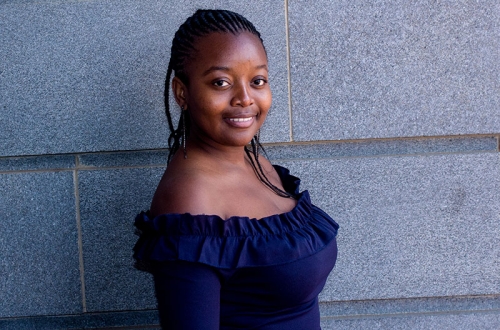Women making a difference through technology


Two UCT honours students developed apps that will help benefit the community of Ocean View in Cape Town during COVID-19. Photo Pexels.
Two University of Cape Town (UCT) computer science honours students have carved out opportunities during COVID-19 by developing apps that will help benefit the community of Ocean View in Cape Town.
While the lockdown may have put paid to their practical work in the community for now, Mapule Madzena and Ndinelao Iitumba have risen above their challenges and are using their skills online to make a difference in the lives of others.
Madzena is developing a mobile app to link domestic workers with potential employers, while Iitumba is using technology to connect community members with customers who are keen to buy face masks.
Iitumba had been at UCT for barely a month when the coronavirus swept into Cape Town, where she had just put down roots after moving from her home country of Namibia. Instead of sitting back, Iitumba plunged into a research project that dovetails with a very real need of COVID-19 – making face masks to protect people from infection – while helping to create employment in Ocean View.
Creating employment through linking people
“Many people from bandwidth-constrained communities can make suitable face masks, but they do not have access to face mask seekers,” explained Iitumba.

Recognising a need and an opportunity, her app brings the two together. Iitumba said she hopes to help seamstresses from the community make an income and at the same time get face masks to as many community members as possible to prevent the further spread of COVID-19.
The app is being co-designed with community members and comes with guidelines on how to make comfortable, washable face masks.
Apart from linking sellers with buyers, Iitumba said the app will allow people to donate face masks or fabric and materials. The donated face masks will be distributed to community members who cannot afford masks, and the donated fabric will be given to seamstresses from the community. The app will also enable seamstresses to upload photographs of their masks.
For Iitumba, it’s a win-win initiative.
“I love this project. It goes beyond just earning marks. It’s about helping the community.”
“In Africa we need to work towards change, and not just learn, but use our experience to help others.”
The project forms part of the broader goal of iNethi, which translates to ‘network’ in isiXhosa. The organisation, initiated by UCT’s Department of Computer Science, works with partners and communities to help locals to tap into their creativity, innovation and other resources and has set up local servers connected to Wi-Fi access points in Ocean View near the southern tip of Cape Town.
Growing up in the small town of Ongwediva, in the north of Namibia, Iitumba developed an interest in computer science in high school. Inspired by her experience of the project so far, she is considering a career as an academic, which she believes will help to bring about positive change in society.
“In Africa we need to work towards change, and not just learn, but use our experience to help others. Let’s use the information and make something great.”
Driving change
Madzena, who hails from rural Limpopo, is also committed to using her talents to drive change.

Mapule Madzena. Photo Supplied.
“I love working and interacting with people. I want to use my skills to engage and help the community.”
Madzena spotted a real need in the community of Ocean View, which has high levels of unemployment, and decided to find a solution. She has been working on a mobile application to match domestic workers who are looking for jobs, with employers. The app is accessible on the iNethi platform.
“I wanted to find a better way of doing things.”
“I grew up in a community where there is very little technology. Domestic workers go from door to door looking for work. People often slam the door in front of them. It can be very discouraging. I wanted to find a better way of doing things.”
Using Madzena’s app, domestic workers who are seeking jobs are able to register, sign in, input their phone numbers and set preferences, such as the area where they would like to work. They are also able to load references, list skills and say whether they would prefer to work for a company or an individual. Once they’ve done that, jobs that match their preferences will be displayed. In turn, employers can post jobs and give feedback.
Madzena has realised how computer science can bring about real change.
“I was initially curious about it at school and now I’ve fallen in love with it,” she said.
Being able to work things out and problem-solve motivates her.
“It sometimes feels like solving the impossible. With our world moving into the Fourth Industrial Revolution, where so much is tied up in technology, I figured out this is where I want to be. I want to be part of the change in the world, especially in South Africa.”
Adapting to the lockdown
For Madzena and Iitumba, 2020 hasn’t quite panned out as they had anticipated when they applied to study for their honours degrees at UCT this year. But they have made the most of it. Iitumba has remained in Cape Town during the lockdown, while Madzena said she has wrapped her studies around family life at her home in Limpopo.
“At first it was difficult working from home, as there are always children playing in the house. I needed to find time, so I often work at night when they are sleeping. I have adapted to it.”
Both students follow up with the community remotely through online meetings and messaging, but are looking forward to getting back to Ocean View when the lockdown restrictions ease.
Until then, they will continue to pursue their goals from a distance to improve the lives of people and spark change through technology.
Story: Kim Cloete